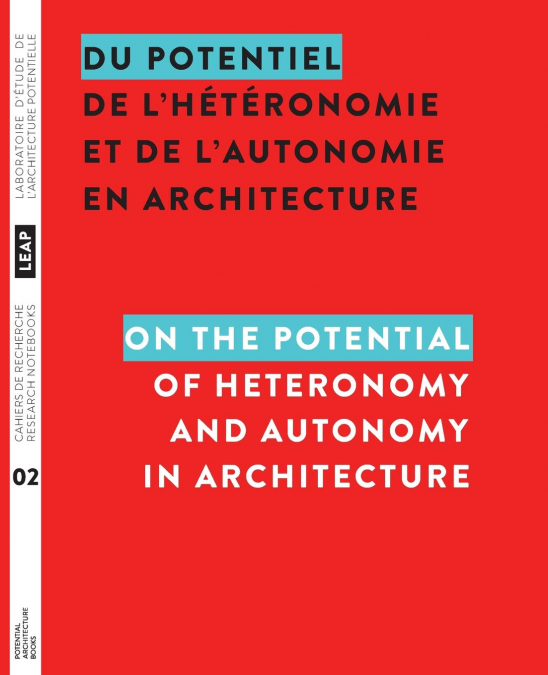
Cette deuxième édition des Cahiers du Laboratoire d’Étude de l’Architecture Potentielle propose une réflexion sur l’un des problèmes centraux du Mouvement moderne et de la critique postmoderne : la tension entre l’hétéronomie et l’autonomie en architecture.Abordé à l’aide d’un texte peu connu de Stanford Anderson, le thème invitait chacun, chacune à penser l’architecture entre profession et discipline, entre hétéronomie et autonomie ou entre histoire interne et externe. Cette proposition aura permis de mettre en valeur la diversité des approches constituantes du L.E.A.P.Afin de tisser des liens originaux entre les propositions des auteurs, ce numéro regroupe 15 essais en quatre thèmes : le débat entre hétéronomie et autonomie, les contraintes et libertés de la création architecturale, la pensée sur l’autonomie disciplinaire et la quête d’autonomies alternatives. Rétrospectivement, une demande d’élargissement et de renouvellement des cadres hérités des approches récentes est devenu le fil conducteur de cette publication.Les essais révèlent la coexistence de points de vue distincts et cohérents, qui chacun à leur manière exprime avec insistance un désir de penser l’architecture autrement. Il s’agit d’une orientation qui, nous l’espérons saura capter l’intérêt des lecteurs et lectrices.Numéro coordonné par Louis Martin et Jonathan Lachance This second edition of the LEAP Research Notebooks examines one of the central problems of the Modern Movement and of its subsequent postmodern critique: the tension between heteronomy and autonomy in architecture.Broached with an often overlooked proposition of Stanford Anderson, the theme offered the research group an opportunity to think architecture between profession and discipline, between heteronomy and autonomy, and between internal and external history. This proposal helped to bring forward the contrasting methods of the members of LEAP.In order to weave connections between the authors’ outlooks, this issue groups 15 essays in four thematic blocks: The Debate Between Heteronomy and Autonomy, Constraints and Freedom in Architectural Creation, Thinking Disciplinary Autonomy, and The Search for Alternative Autonomies.Retrospectively, a demand for an extension and a renewal of the frameworks received from recent approaches has become the red thread of this publication.The essays reveal the coexistence of distinct and coherent outlooks in which LEAP researchers insistently express a desire to think architecture differently. It is an orientation, we hope, that will arouse the interest of readers.Issue coordinated by Louis Martin and Jonathan Lachance